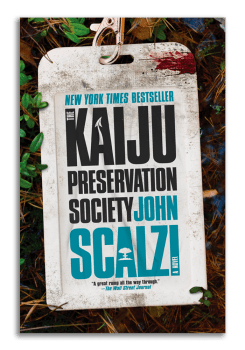What Happens When A Giant Monster Goes Nuclear In An Alternate Universe?
In the alternate world of John Scalzi’s “The Kaiju Preservation Society,” giant monsters explode like nuclear bombs. It’s a regular Tuesday.
The following is an excerpt from The Kaiju Preservation Society by John Scalzi.
Disclaimer: When you purchase products through the Bookshop.org link on this page, Science Friday may earn a small commission which helps support our journalism.

The Kaiju Preservation Society
So here is what happens when a kaiju explodes with the force of a nuclear bomb.
First, there’s the actual explosion and what comes immediately after.
To start, there’s a nuclear fireball about 250 meters in diameter vaporizing anything inside of it, including the kaiju in question. This made an impressive crater on the shore of that unnamed lake, which because it was on the shore, was now filled in by the lake itself.
After that, a kilometer-wide zone of heavy damage: trees shredded and on fire, animals turned into charcoal, everything literally a smoking ruin.
Beyond that, four kilometers of trees knocked down and everything in the zone receiving what on our Earth would be a decidedly fatal dose of ionized radiation. Kaiju Earth creatures were hardier, as Aparna noted, but it’s not to say that those in this area were happy, because there was still thermal radiation to consider. Everything alive in that zone got burned, fatally or otherwise.
The kaiju exploded near the surface, and the mushroom cloud sucked up a vast amount of dust and debris, launching it thousands of meters into the air to be distributed by the prevailing winds—fallout. That fallout would eventually spread itself over more than a thousand square kilometers of the Labrador Peninsula.
The Kaiju Earth atmosphere was thicker and more oxygenated than the air back home, which offered special considerations concerning the damage of the blast—the initial shock wave from the blast had more pressure behind it, creating a wider radius of destruction, and the extra oxygen gave fires more fuel to burn. This was counteracted by the fact that the place the kaiju went up at was effectively a swamp jungle, and the trees on Kaiju Earth have evolved rather better fire resistance than the ones back home. Which meant the firestorm resulting from the blast was relatively brief and limited. A storm that came up from the west in the evening dampened it further.
At no time was the Tanaka Base threatened by the blast or its aftereffects. All the action happened almost a hundred kilometers southeast of the base, and the prevailing winds in the area blow generally toward the east, driving the fallout away from the base in any event. We were fine. It was fine.
This felt… weird.
“Of course it feels weird,” Niamh said to me the day after the explosion, after dinner, when I confessed my feelings about it to them. “Back home, a nuclear explosion is an existential threat. Here, it’s just Tuesday.”
“It’s Monday,” Aparna said, from the couch, where she was reading a report on the day’s events.
“It’s just Monday,” Niamh amended, then turned back to Aparna. “You sure it’s a Monday?”
“Pretty sure.”
“It feels like a Tuesday.”
“I think every day feels like a Tuesday here.”
Niamh snapped their fingers. “That’s it exactly. And my point to you”—coming back to me—“is that you’ve drunk up decades of cultural angst about nuclear explosions and nuclear power. It’s a big bad back home.” She pointed at Kahurangi, who was also catching up on his reading. “This one’s whole damn country is a nuclear-free zone.” “Go, Aotearoa,” Kahurangi said, absentmindedly, pumping a fist. He didn’t look up from his reading.
“Now you come here,” Niamh continued, “and not only is it not a big bad, it’s part of the actual ecological setup. A kaiju going up here is like a whale fall back home.”
“A what?” I asked.
“A whale fall,” Aparna said from the couch. “When a whale dies its body sinks to the bottom of the ocean, where it feeds an entire ecosystem for months or even years.” She looked up at Niamh. “Not a perfect one-to-one metaphor, but okay.”
“Thank you for your qualified approval,” Niamh said, and returned to me. “It feels weird because not only are you being forced to look at this terrible event in a whole new way, and in a way that’s positive for the world it exists in, but you’re also not allowed to have it completely rewrite your opinion of the event in our world. Because back home it’s still a terrible thing.”
“‘One nuclear bomb can ruin your whole day,’” quoted Kahurangi.
Excerpted from The Kaiju Preservation Society. Copyright © 2022 by John Scalzi. Excerpted by permission of Tor Publishing Group. All rights reserved.
John Scalzi is a New York Times bestselling author of the Old Man’s War novels, The Kaiju Preservation Society, and many others. He has won several awards for his writing, including the Hugo, the Locus, the Audie, the Robert A. Heinlein, the Seiun and the Kurd Lasswitz.